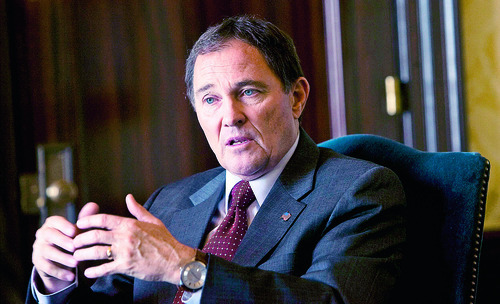This is an archived article that was published on sltrib.com in 2011, and information in the article may be outdated. It is provided only for personal research purposes and may not be reprinted.
Gov. Gary Herbert said he anticipates the Legislature will repeal a bill restricting public access to government records Friday, even though there is still some question of whether there are enough votes in the Senate to rescind the bill.
"There is some reticence in the Senate in particular and I think they will have that discussion and I think come to the conclusion that it's best for us to push the reset button and start over," Herbert said during his monthly KUED news conference. "I think that's best for them, best for the Legislature, best for the people of Utah and I think they'll come to that realization."
Twelve senators, including all seven Democrats, will vote to repeal HB477. Four senators — Senate President Michael Waddoups, and Sens. Howard Stephenson, Peter Knudson and Lyle Hillyard — have said they will vote against a repeal. Five are undecided, four will be absent and four could not be reached. A minimum 15 votes is required for Senate passage.
The records law would restrict public access to text messages, instant messages and video chats and give governments more latitude to charge attorney fees and other expenses for responding to requests. It would also end the presumption that government records are public.
The legislation was passed quickly at the tail end of the legislative session — faster than 99.5 percent of the bills adopted by the Legislature, excluding budget bills, according to an analysis done by Adam Brown, a professor of political science at Brigham Young University.
The bill created an outpouring of opposition across the political spectrum and sparked an effort to gather 97,000 signatures to put a referendum on the ballot to repeal the legislation.
Senate leaders have expressed frustration that the governor did not consult with them before calling the special session. Senate Majority Leader Scott Jenkins, R-Plain City, said he got a call from Lt. Gov. Greg Bell telling him the governor was going to call the special session and Jenkins told him he didn't know if there was support for that.
"He said, 'You're on your own there. We're calling the session,' " Jenkins said.
Hillyard, for example, said there should have been no rush to repeal HB477, which doesn't take effect until July 1, and holding the special session on a day legislators were already planning to meet could have saved taxpayers $30,000.
Herbert acknowledged that he could have coordinated better with the Senate.
"We try to communicate well and sometimes we fail," he said. "It just came time to say, 'push the reset button.' "
But Herbert said, on an issue as divisive as this one has been, it is worth the cost to repeal the bill.
The governor again defended his decision to sign the GRAMA legislation, after he negotiated a deal to delay the implementation until July 1.
He said there was a real threat that the Legislature could have overridden his veto and a bad bill would have become law. The bill with the delayed implementation passed the House with 42 votes, short of the 50 that would be needed to override, but it was unclear how an override vote would have broken.
"Hindsight is certainly a little clearer picture," he said. "I think we did the right thing under the circumstances."
He said a working group is in place now to discuss the issues publicly and he believes it will come to "the right outcome." That 25-member commission met for the first time on Wednesday and plans to meet weekly until it has tackled the issue.



